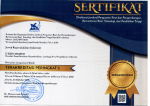ANALISIS FAKTOR-FAKTOR YANG MEMPENGARUHI MOTIVASI BERWIRAUSAHA DI KOTA PEKANBARU
Abstract
Today, in Pekanbaru the situation of an abundant manpower supply but limited market capacity makes people, unable to find work, anxious to create their own businesses (self employment). Using primary data, the goal of this paper is to show the individual level determinants of self employment. A logistic regression model is used to estimate different aspects of choices between self employment and working for a salary. This study argues that age, gender, education, Chinese ethnicity and marital status play a significant role in the decision to become self employed in the city of Pekanbaru. As well, other variables such as Melayu or Minang ethnicity and migrant status play a small role in determining who is self employed. Most of the coefficients are positive, except for education and Melayu ethnicity with the Minang and Chinese ethnicity probability to become self employed better than that of the Melayu. There are some suggestions that Minang and Chinese people may place a higher value on entrepreneurship than do the Melayu. Indeed, the Chinese having faced severe discrimination have been pushed into self employment in large numbers. This research, however, also shows that the differences in decisions to be self employed vary substantially across ethnic lines. Therefore, the development of entrepreneurship requires a systematic and integrative approach to find out just what is involved in creating an environment conducive to the growth and development of entrepreneurship.
Key Words : Self Employment, Personal Characteristics, Ethnic, Pekanbaru City
Keywords
Full Text:
PDFReferences
Aldrich, H. and Waldinger, R. (1990). Etnicity And Entrepreneurship. Annual Review Of Sociology, XIV.
Andriani, Evi. 2010. Artikel Tentang Kewirausahaan. Yogyakarta: Lembaga Pendidikan Ma'arif.
Badan Pusat Statistik Pekanbaru. Kecamatan Dalam Angka 2009 dan 2010
Badan Pusat Statistik Pekanbaru. Pekanbaru Dalam Angka 2009 dan 2010
Badan Pusat Statistik Pekanbaru. Penduduk Kota Pekanbaru (Hasil Registrasi) 2009.
Borjas, G. (1986). The Self-Employment Experience of Immigrant. National Bureau of Economic Research. Working Paper No. 1942.
Borjas, G. (2000). Labor Economics. New York: The McGraw-Hill Companies.
Borjas, G., Bronars, S. (1988). Customer Discrimination and Self Employment. National Bureau of Economic Research. Working Paper No. 2627.
Clain H. S. (2000). Gender Differences in Full-Time Self Employment. Jornal of Economics and Business; 52. p : 499-513.
Cuervo, A. (2005). Individual And Environmental Determinant Of Entrepreneurship. Jurnal I International Entrepreneurship And Management Manufactured In The United States.
Dewi A, Yunita. (2009). Analisis Faktor-Faktor Yang Mempengaruhi Lulusan SMK Dalam Berwirausaha Di Sumatera Barat, Padang: Pascasarjana Universitas Andalas.
Dinas Tenaga Kerja. Peraturan Daerah Kota Pekanbaru Nomor 4 Tahun 2002 Tentang Penempatan Tenaga Kerja Lokal.
Elfindri dan Nasri Bachtiar. 2004. Ekonomi Ketenagakerjaan. Padang: Andalas University Press.
Fairlie, Robert W, dan Meyer, B. D. (1994). The Ethnic and Racial Character of Self-Employment. National Bereau of Economic Research. Working Paper No. 4791.
Fairlie, Robert W, dan Meyer, B. D. (1999). Trends in Self Employment Among Black and White Men : 1910-1990. National Bereau of Economic Research. Working Paper No. 7182.
Gilad, B and Levine, P. (1986). A Behaviour Model Of Entrepreneurial Supply. Journal of Small Business Management, 24.
Light, Ivan. 1972. Ethnic Enterprise in America, Berkeley: University of California Press.
Meredith G, Geoffrey. (2000). Kewirausahaan : Teori dan Praktek, Jakarta: Pustaka Binaman Pressindo.
Nachrowi, D. dan Usman, H. (2002). Penggunaan Teknik Ekonometri, Jakarta: PT. Raja Grafindo Persada.
Naim, M.. (1974). Merantau, Pola Migrasi Suku Minang Kabau, Jogjakarta: Gajah Mada University Press.
Prihatin, B. (2003). Kewirausahaan Dari Sudut Pandang Psikologi Kepribadian, Jakarta: PT. Gramedia Widiasarana Indonesia.
Rasidi, A. (2008). Kewirausahaan Sebagai Sarana Mengurangi Pengangguran.Diklat SMK Negeri 20 Jakarta.
Rudiwan. (2005). Belajar Mudah Penelitian. Bandung: Alfabeta.
Sjafrizal. (2008). Ekonomi Regional: Teori dan Aplikasi Padang, Badouse Media.
Stevenson, H. H. (2000). Why Entrepreneurship Has Won !. USASBE Plenary Address Harvard University. Coleman White Paper.
Subri, M. (2003). Ekonomi Sumber Daya Manusia, Jakarta: PT. Raja Grafindo persada.
Suryana. (2003). Kewirausahaan, Pedoman Praktis, Kiat Dan Proses Menuju Sukses, Jakarta: Salemba Empat.
Suryana. (2004). Memahami Karakteristik Kewirausahaan. Modul I Kewirausahaan SMK. Dikmenjur. Departemen Pendidikan Nasional
Sofyardi. (2007). Analisa Regresi Logistik Dalam Ilmu Ekonomi. Makalah Pelatihan Pengajaran Untuk Staf Pengajar Fakultas Ekonomi Universitas Andalas Padang.
Wijadi, S. (1988). Pengantar Kewirausahaan, Bandung: Sinar Baru.
DOI: https://doi.org/10.14203/jki.v7i1.85
Copyright (c) 2016 Jurnal Kependudukan Indonesia

This work is licensed under a Creative Commons Attribution-NonCommercial-ShareAlike 4.0 International License.
-----------------------------------------------------------------------------------------------------------------------------
Research Center for Population, Indonesian Institute of Sciences
Widya Graha Building, 7th and 10th floors
Jl. Jenderal Gatot Subroto 10 Jakarta Selatan, Telp (021) 5221687
Website: http:/kependudukan.lipi.go.id;
E-Journal: http://ejurnal.kependudukan.lipi.go.id
Pustaka: http://pustaka.kependudukan.lipi.go.id
-----------------------------------------------------------------------------------------------------------------------------








